Why your 40s suck (backed by data)
“Dad. What’s that coming out of your nose?”.
No, it wasn’t what you think it was. That would be gross. But the screwed-up face of my son was enough to make me dash to a mirror to check it out.
There it was in all its glory.
A hair.
“Oh no,” I thought (rather dramatically), “That’s it, I’m at that stage of life where things start sprouting out places they didn’t before.”
That’s being over 40.
Things are changing. Life isn’t what it was before.
Nostalgia for days gone by washes over me, oh the beauty of youth.
Oh, the additional levels of grooming maintenance now facing me.
Turning 40 can be a daunting experience for a man, and maybe you have the same questions as me.
What should I expect from life in my 40s?
What is there to look forward to now?
Is there a whole world of problems lurking around the corner for me?
It feels like a tough decade. Talking to buddies confirmed this too, but I wondered if any solid data backs this up. And why?
What is it about this decade that results in a dip in well-being?
So I’ve searched the web to find out what the research and data say about being a man in your 40s.
This is what I found (And stick with it because it’s not all bad).
6 reasons why the data says your 40s will be hard

1). This is the most unhappy period of your life (statistically speaking)
Some clever academic bods reviewed a lot of studies (409) that identify a U-shaped happiness curve with a dip in mid-life, which for men peaks around 47 years old.
One of the studies by David G Blanchflower identified that in the US specifically, deaths of despair are most likely to occur in middle age and are associated with unhappiness and stress.
Blanchflower identified being in your 40s and 50s intensifies vulnerability to shocks such as a global financial crisis or a pandemic. Particularly in those sections of society that already have disadvantages due to disability or lack of education, lost jobs, etc.
For men in their 40s, life circumstances and age can interact in a potentially damaging spiral.
It can be challenging, especially for men, to ask for support at any time in their lives, but in midlife, this can be even harder. Feelings of shame and isolation prevent them from showing vulnerability and asking for the support they need.
Comparisons with peers, a feeling of not being where they feel they should be at this point of their lives, and a sense of time running out can further deepen unhappiness in mid-life.
It can be a challenging time. But why? What other factors are at play?
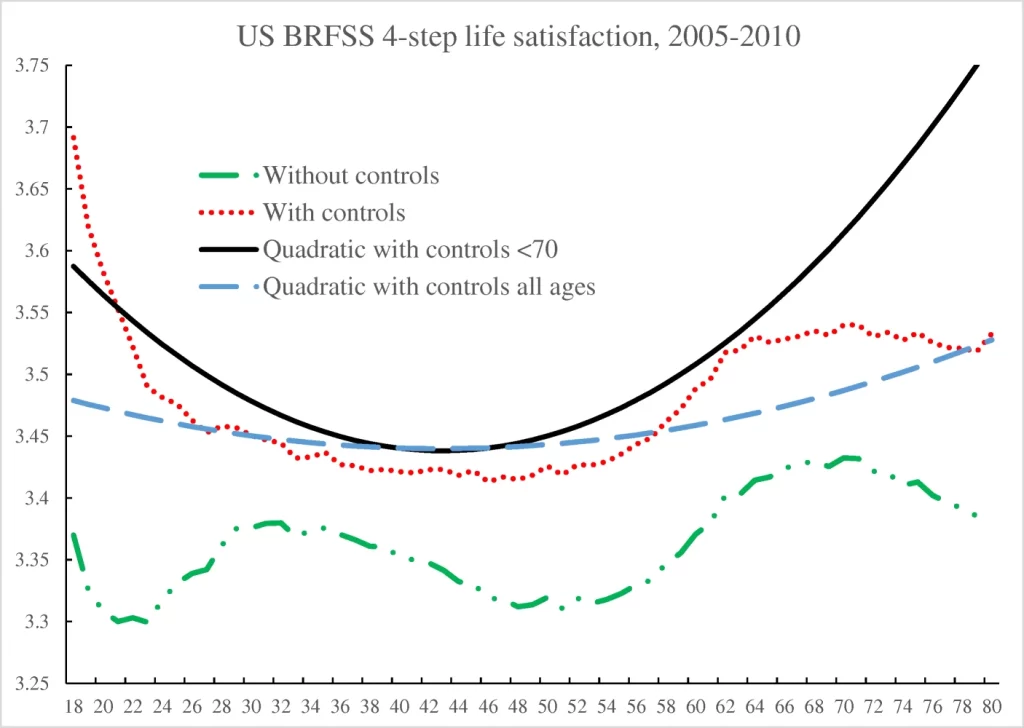
2). Men in their 40s have less leisure time
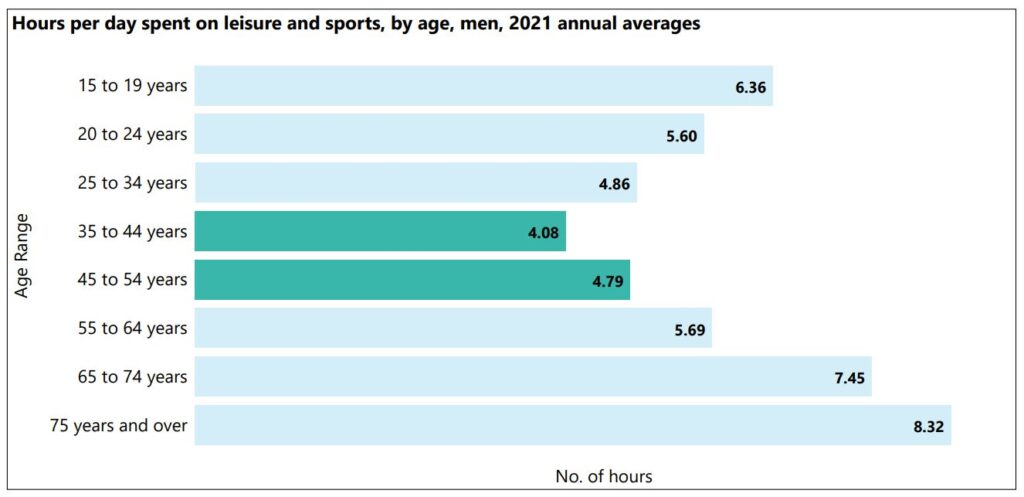
I get it; you like nothing better than donning some tight-fitting lycra and pounding the streets? Or the feeling of the wind in your (thinning) hair as you mountain bike down some dirt tracks?
Or maybe, like me, you love sitting in your favorite chair in your reading robe with a good book? (what? You don’t have a reading robe?!)
Yeah, if you’re in your 40s, you won’t have much time for that stuff now. The data says so.
The American Time Use survey found that men in early midlife spend less time on sports and leisure activities than men in other age groups.
Why does lack of leisure time matter?

It matters because there is a direct link between well-being and leisure activities. A study on leisure time found that individuals that enjoy and actively participate in leisure experience less anxiety, depression, and hostility.
Go figure.
It’s not that this time needs to be pumping out a solid session at the gym. Other studies have shown that going for a walk or even chatting with a pal or family member reduced anxiety, restored attention, and improved mental health.
All achievable stuff. If you’ve got time.
So why do men in their 40s have less leisure time?
The American Time Use Survey can shed some light on this too:
3). Men in their 40s spend more time caring for others in their household
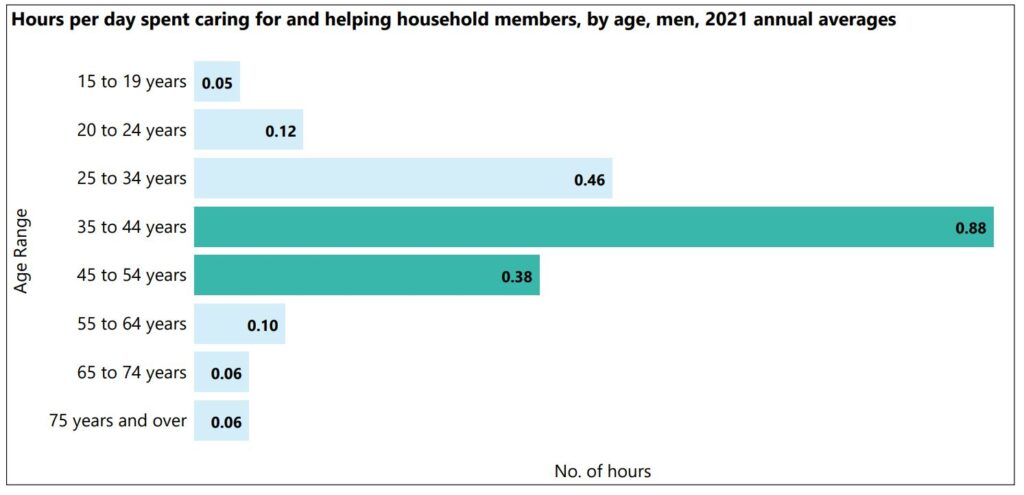
Especially in your early 40s, you may still be caring for young children. This is the toughest of phases; these little people need you for everything. You will be exhausted. Endlessly.

Knee-deep in diapers, sleepless nights, play dates, and laundry. This is in-the-trenches stuff, and something has to give. And it looks like leisure time is the thing.
But fear not. By your mid-50s, things start to look up as you begin clawing back that leisure time.
4). Men in their 40s spend more time caring for other members outside their household
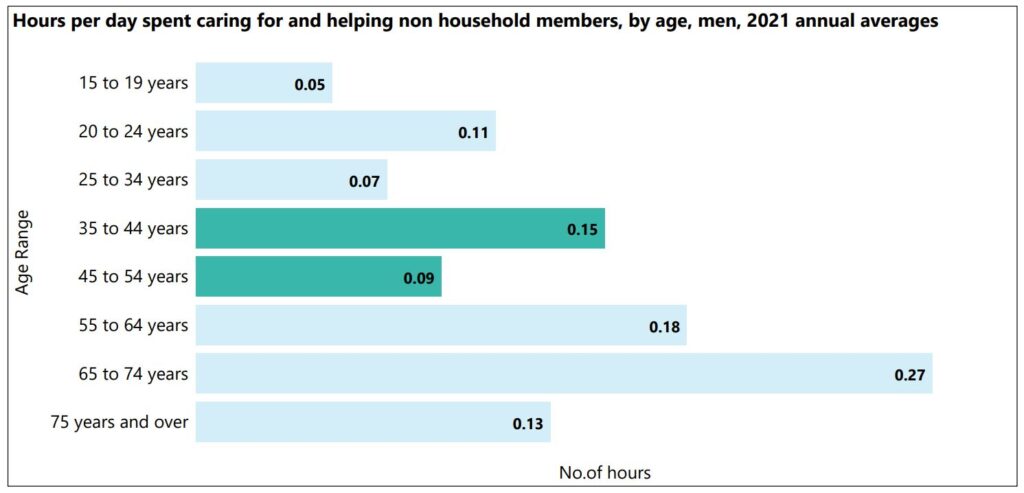
Then in a perfect storm, on top of caring for your children, in your 40s, you start to notice your parents are getting old. The realization they may not be around forever, and health problems start popping up.
Your time will be squeezed further with care for elderly relatives outside your household.
The American Time Use Survey highlights how American men in their mid-30s to mid-40s are spending more time than younger age groups caring for and helping other non-household members.
5). Men in their 40s spend more time working
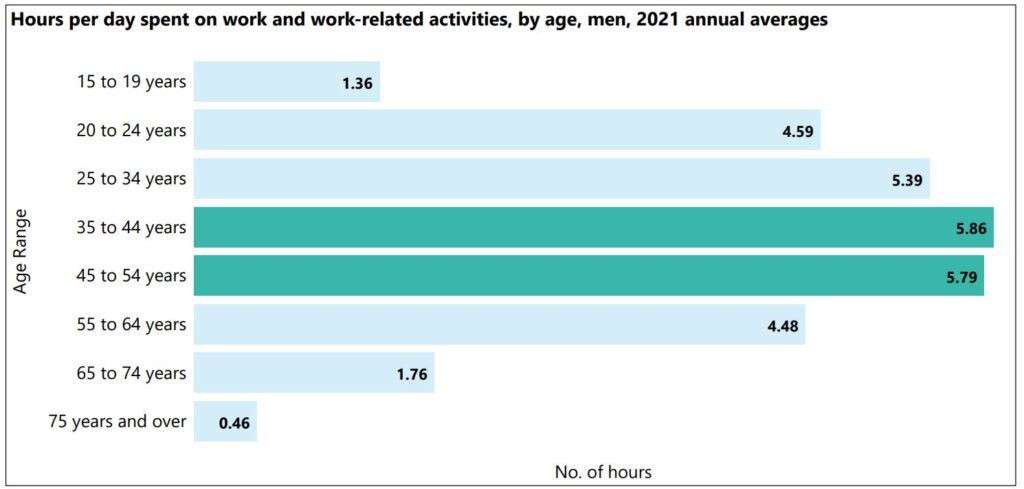
It’s not that you love the office and that swivel chair that’s really comfy. No, or the coffee vend that keeps you there late at night. Of course, it isn’t.
What is it, then? Why the hell are you working so much?
So you’ve got young children and elderly parents that take up a fair chunk of your time, and on top of that, you are working more too.
The chart says it all.
American men in their 40s work more hours than other age groups. At this point in your life, you will be looking to the future and wanting to make sure you are in a secure position.
Maybe you are in a position of responsibility with years of experience under your belt. And with responsibility comes the need to put in the hours. We get ya. Just be careful. You don’t want to get burned out.
On the plus side, your 40s is where you head towards your peak earning potential (more of that to come).
6). Men in their 40s spend less time on personal care
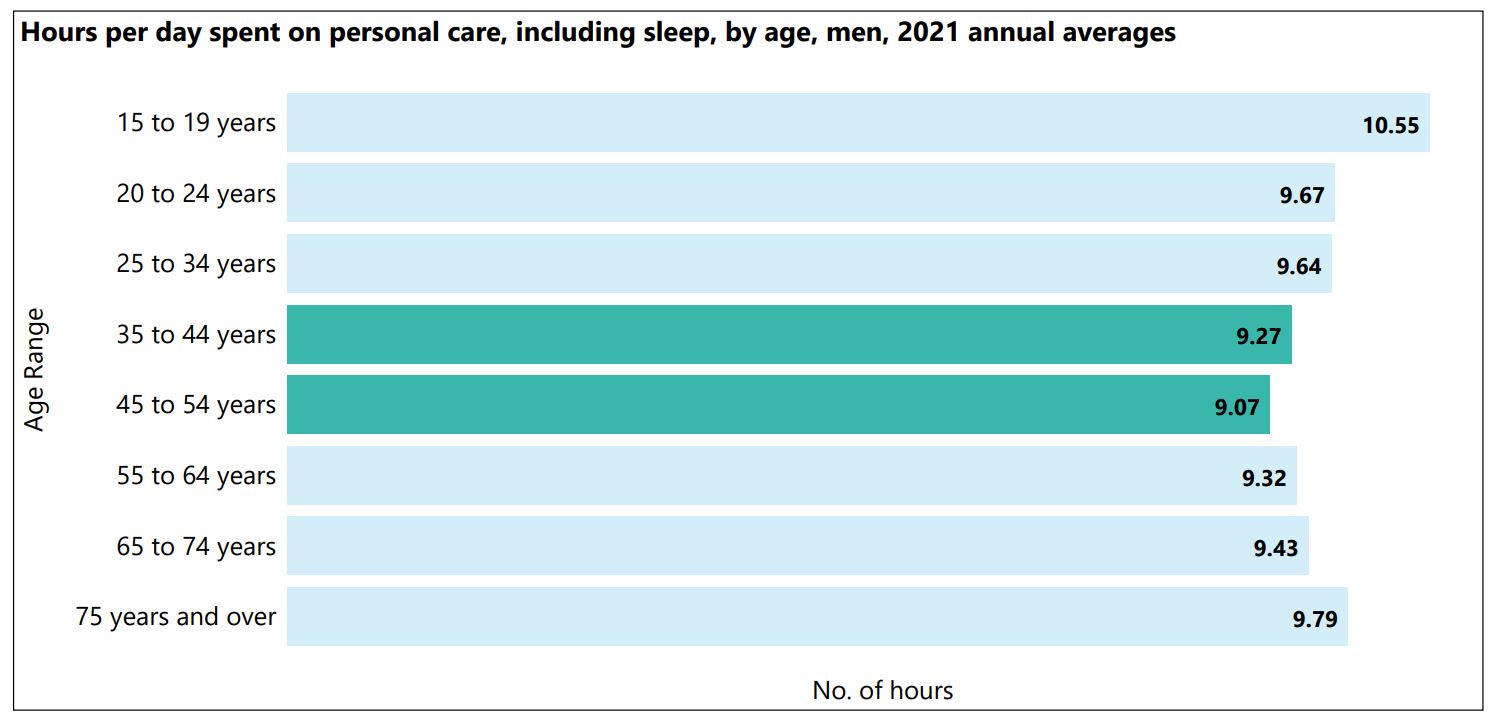
Oh, dear. Come on, guys, don’t let this stuff slip. Ok, the sleep bit looks tough, but washing, grooming, and general hygiene are musts. Keep it together, guys, please.
This is the low point for personal care. If you have young children, you will know this already. Children will disrupt your sleep; there will be days when you forget to do the basics regarding personal care. It’s tough going, but it doesn’t last; by your mid-50s, you’ll start seeing your leisure time increase again as your children become more independent. Let’s hope you’ve got some hair left by then.
Stick with it!
And if you can’t wash, keep an emergency deodorant in the car.
6 reasons why being a man in your 40s is GREAT!
So if you’ve made it this far, you could be forgiven for feeling a little down about your 40s, thinking there isn’t much to be positive about. But that’s just not true.
But if you can avoid the midlife dip, there are some genuinely great benefits to being in your 40s. Also backed up by data.
So here goes:
1). Men in their 40s earn more than younger age groups

All that work counts towards something.
Through your 40s, your pay growth continues to increase steadily, according to compensation research firm PayScale, not peaking until the age of 55, with men, on average, earning $101,200 by this point.
2). Men in their 40s have a higher disposable income

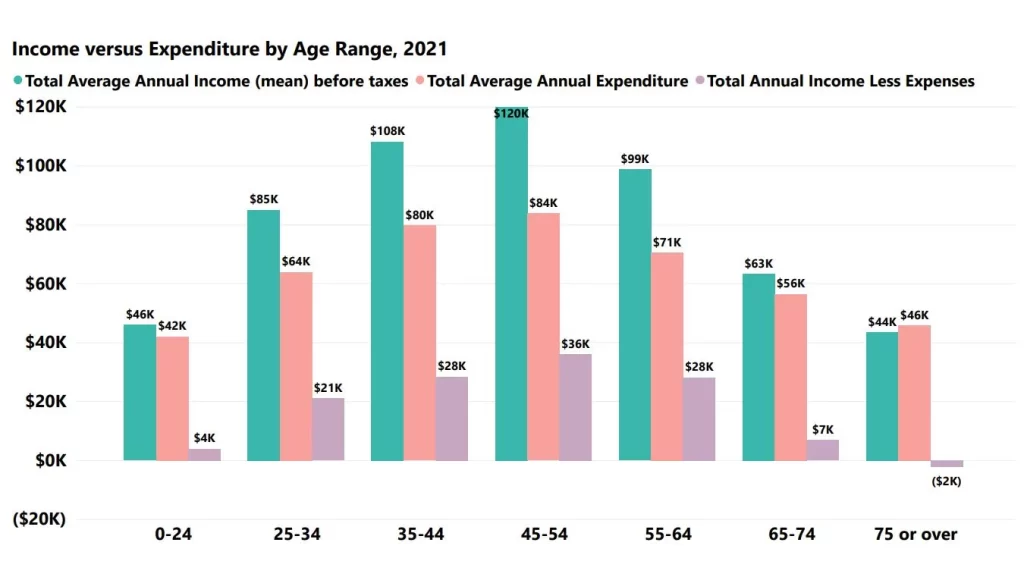
And it’s not just earnings you benefit from in early midlife. It’s also disposable income.
The US Bureau of Labor Statistics identified in its 2021 consumer expenditure survey that people between 35 and 54 have the largest disposable income versus other age groups.
Although expenditure increases across their 40s, men continue to grow their incomes too, not peaking until their early 50s.
Your 40s is an essential decade for securing your financial future and building net wealth.
3). Men over 40 have more confidence

According to research by Zenger Folkman, being over 40 comes with increased confidence. By now, you will have a decent amount of life experience. You will have a better idea of who you are and what you want out of life, which shows newfound confidence.
This may be because of where you are at with your career, demonstrating expertise in a specific area, or you may be a father with the responsibility that comes with that.
And this only gets better with age now.
Embrace it.
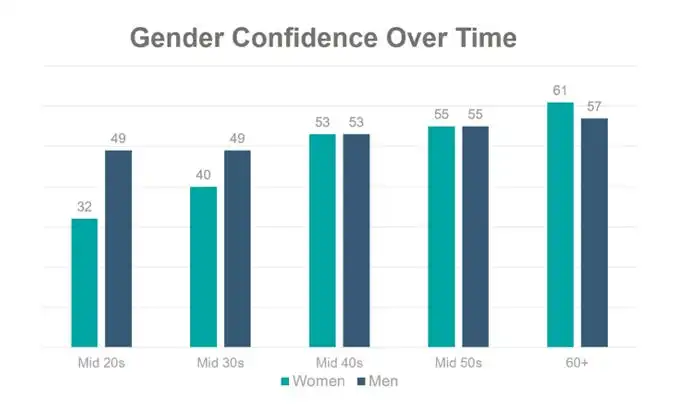
4). Your brain is now fully developed

Research by Sarah-Jane Blakemore, a neuroscientist at the Institute of Cognitive Neuroscience at University College London, identified that the brain continues to develop through early adult life, not reaching maturity until people are in their 30s.
White matter volume in the brain continues to increase in volume until the age of 40. Helping to wire up previously separated brain areas and improve cognitive control – the ability to suppress emotional impulses.
So there may be a biological reason why you’ve been throwing tantrums when you don’t get your own way.
It’s been your previously immature brain.
But by your 40s, this process is complete, so you can’t use this as an excuse for your behavior any longer (damn).
On the plus side, once brain maturation is complete, you’ll find more emotional stability than at earlier points in your life, which should put you in a good place to deal with the challenges of being in your 40s.
5). Your car insurance will go down

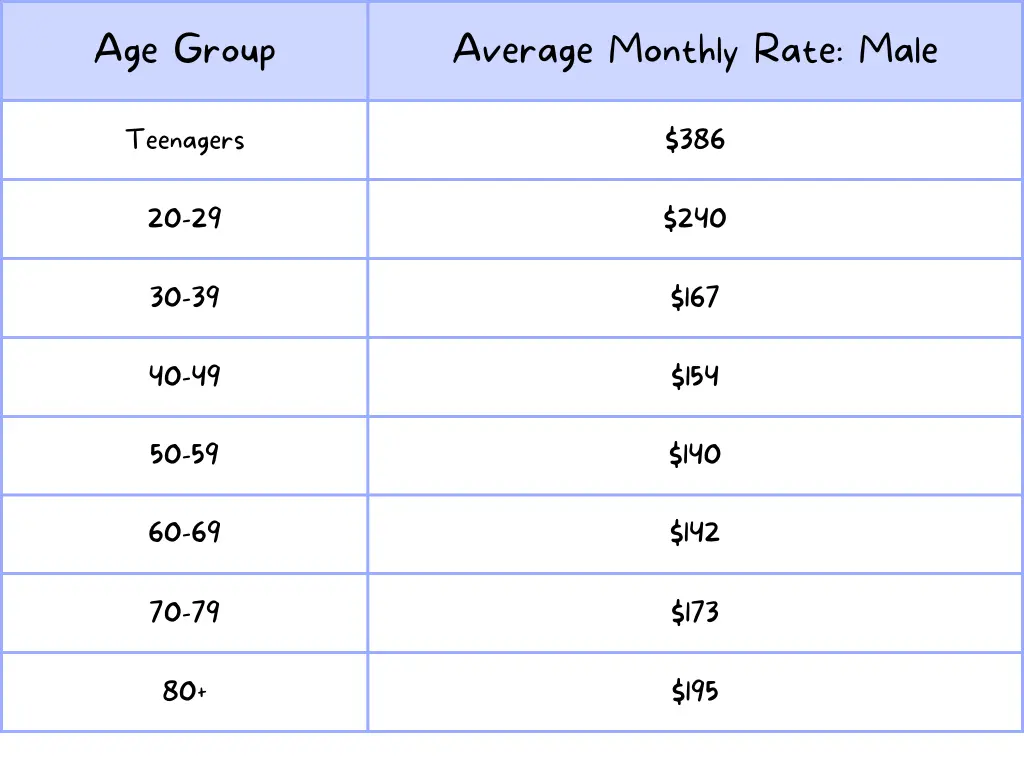
Over 40? Ok, well, insurers think you’re more responsible. Of course, you are. I mean, they weren’t there at the last boys’ weekend you went on, were they?
Thank god.
So now you are in your 40s, your monthly premiums should be going down, and the data shows that this trend should continue until you hit 70 (assuming you don’t have any accidents).
So enjoy the extra cash for the next boys’ weekend.
And Finally,
6. Men over 40 are great at handling hangovers (No, seriously!)

Ok, I had to read this twice too.
It doesn’t feel like they get easier, but research suggests it does. An online survey of 761 Dutch alcohol consumers aged 18-94 found that as we age, we develop an increasing tolerance to alcohol and experience less severe hangovers.
I think those in their 40s are made of tougher stuff.
Either that or maybe it’s the Dutch who are made of tougher stuff because I swear my hangovers are getting worse!
I guess one way to look at it is if these six reasons your 40s will be great are not enough to offset the six reasons why they will suck, you can always turn to alcohol because, you know, the data says you’ll be good with the hangover.
Let me know how that goes!


